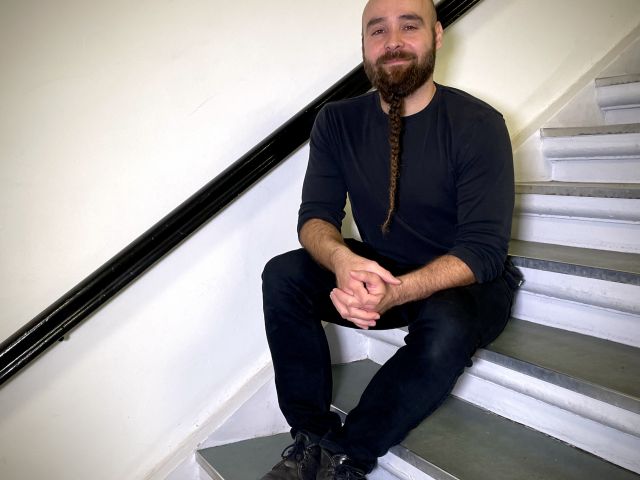New job satisfaction survey: Previous results have not been followed up and employees are exposed to offensive behavior

(Photo by Anna Holte)
At an extraordinary meeting on 24 February, the General Consultation Committee will discuss following up on various points in the satisfaction surveys.
The new CBS job satisfaction survey from the autumn 2021 reveals that, once again, previous results, this time from the job satisfaction survey in 2019, have not been followed up and staff members feel unable to speak up about procedures at CBS. Meanwhile, as confidence in the Senior Management is decreasing, experiences involving insulting behavior are increasing. Also, employees think career opportunities at CBS are not transparent.
However, on the more positive side, the report shows that employees generally think they possess the skills required to do their jobs, feel their job tasks are meaningful to them, and believe their immediate managers are sufficiently accessible in daily working life.
In November, The General Consultation Committee (HSU) at CBS, held a meeting where the results of the report were discussed. Here, the committee “did not reach an agreement as to which focus areas CBS is to actively work on to follow up the job satisfaction survey of 2021,” as the minutes of the meeting say. That discussion has been postponed until an extraordinary meeting on February 24.
Offensive behaviour
At the forthcoming meeting, HSU will most likely discuss whether to make the numbers regarding harassments a so-called “focus area” to work on. At least, those are numbers which to the committee members “seem high”, as the minutes of the last meeting in November would suggest.
In the survey, 1,288 staff members responded to the question: “Have you, within the last 12 months, been subjected to … at your workplace?” Of these, 1% answered that they had been subjected to ‘unwanted sexual attention’, which is the same percentage as the category had in the 2019 survey. 3% of the answers reported being victims of bullying, which is a decrease from 2019 when the rate was 5%.
However, 6% answered that they had experienced ‘harassment or other verbal, offensive behavior’, which is a whole new survey category.
Although the number of respondents who have experienced abusive behavior was interpreted as high by HSU at the last meeting, no concrete solutions as such were brought to the table.
However, based on these specific results, HR is now “focusing on” how to take precautionary measures against future incidents of offensive behavior in order to stop them from occurring.
Abusive behavior carried out by colleagues
Concerning where and who the violators are, the survey scores speak for themselves.
In general, the offensive behavior has been experienced with colleagues from the respondents’ own units. That applies to ‘bullying’ (59% of 39 replies), ‘harassment or other verbal, offensive behavior’ (52% of 79 replies), ‘unwanted sexual attention’ (50% of 8 replies) and ‘threats of violence’ (60% of 5 replies).
Even though most of the abusive behavior reported has taken place at CBS and been carried out by colleagues, it seems largely that the victims have been open about their experiences at their workplace.
Thus, 67% of those who have been bullied, 77% of those who have been exposed to harassment or other verbal, offensive behavior, and 63% of those who have received unwanted sexual attention have all stated in the survey that they have discussed the problem with someone at their workplace.
However, responses about whether the issues have been resolved seemingly differ depending on the type of abusive behavior in question.
For instance, more than half of those who have experienced being bullied or harassed say ‘no’ when asked if the problem has been taken care of (64% and 56% respectively). As for those who have experienced unwanted sexual attention, half of them state that the problem has been taken care of, while 38% of them say it has not.
Among those who have received threats of violence, the percentage distribution is rather more fragmentary. While they all responded that they have talked to someone at work about the matter, 40% say that the problem either has been, or has not been, taken care of. The last 20% say their case is in process.
The survey paints a picture of victims of offensive behavior sharing their experiences, but the problems remain unresolved.
However, at the HSU meeting, it emerged that the group of shop stewards do not receive as many requests from victims as the numbers in the survey reflect.
“HSU discussed why that could be. Partly, perhaps the shop stewards system doesn’t work, and partly, some employees might not want their cases brought up and therefore choose not to approach their shop stewards,” the minutes of the meeting report.
Follow ups and transparency
On the subject of problem solving, another survey result shows that staff members think follow-up on the survey from 2019 has not been good.
That was also the case back in 2019 when CBS WIRE reported on how the results from the latest job satisfaction survey showed that both TAP and VIP staff confirmed a lack of follow-up on the 2016 job satisfaction survey.
Back then, VIP and TAP employees had a combined score of 3.7 out of 5 concerning their agreement with the statement ‘In my unit, we follow up on the 2016 employee satisfaction survey’.
In the 2021 survey, TAP, DTAP and VIP employees together scored 3.6/5 for that same statement, reflecting a -0.1 decrease in the staff members’ agreement with the statement.
But following up on surveys from previous years is not the only theme that seemed to recur in the recent survey report.
Once again, in the 2021 survey, both TAP and VIP staff do not think career opportunities at CBS are transparent (2.8/5). In 2019, the score for that statement was 2.9.
Reviewing the results broken down on background parameters, clearly this view is generally held by employees from the age of 30 and up. However, primarily female staff (2.7/5) and PhDs, Assistant Professors and Associate Professors share the point of view that career possibilities are not tangible (2.8/5).
Less and more confidence
When the 2017 job satisfaction survey was released, the academic staff rated their confidence in the Senior Management at only 2.6 out of 5.
The low score resulted in the appointment of a committee to review the job satisfaction survey and produce a report on the reasons for the low score. This also included assessing the reasons for the low rating for the question ‘I feel able to speak up and give my views/suggestions on the way things are done at CBS’ (3.3/5).
In 2019, the academic staff’s confidence in the Senior Management improved by 0.7 to 3.3/5. And overall confidence in the Senior Management improved from 3.3 to 3.5/5.
In the 2021 survey report, the overall confidence in the way top management runs CBS has decreased again by -0.2 and is back at 3.3/5. Here, mainly professors experience a lack of confidence in the Senior Management. Altogether they score a total of 2.8/5.
When the employees were asked about themselves, though, the picture varied compared to previous years. This time, the change is on the positive side of the scale.
The statements ‘I have the skills required to perform my job well’ and ‘my knowledge and skills are being put to good use in my job’ scored 4.4 and 4.1/5, respectively, which spells an 0.1 improvement for both scores.
Similarly, the employees’ opinions of their immediate leaders also improved.
Thus, the statement overall, ‘my immediate manager is a good personal manager’ scores 4.2/5, staff members also think their immediate managers engage constructively in new ideas and suggestions (4.2/5) and, finally, they also agree that their immediate managers are sufficiently accessible in the daily work life (4.4/5).
Each of those statements achieved an improvement of 0.1 since 2019.







































































































































Comments